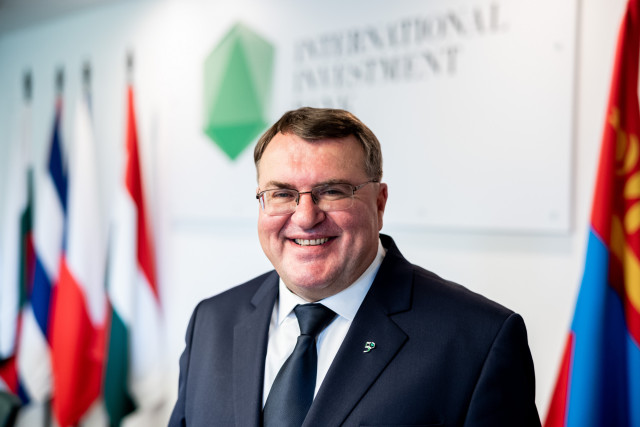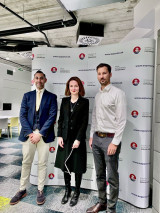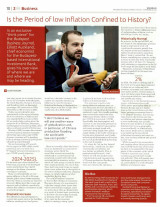Deputy Chairperson Imre Laszlóczki spoke to KarcFM: new permanent IIB Headquarters in Budapest, post-COVID economic recovery prospectives and other key issues.
Source: KarcFM
Questions and answers about the economy. Business magazine with Anita Kovács.
Going from Pest to Buda via Chain Bridge and looking to the right, you can see a very nicely renovated palace, the Chain Bridge Palace. Recently, this beautiful classicist building has gained fame for becoming the new permanent headquarters of the International Investment Bank, as part of the final step in relocating the bank to Europe. Greetings to the Vice President of the bank, Mr. Imre Laszlóczki, who is on the other line.
Welcome!
Thank you Anita, and greetings to everyone!
Why did you choose this particular building? Why did you decide to choose to move your headquarters into the very center of the city?
Even back when the member states, on Hungary's initiative, voted in December 2018 to move the bank's headquarters to Budapest, the topic came up that we would need a building for our headquarters. Hungary had rejoined the bank not long before, in 2015, but this December 2018 date was crucial for the selection of the building, because we had already started thinking about the need for headquarters. The main criteria for selecting this building were as follows: first, the building should be suitable for IIB - the International Investment Bank. The bank is known as IIB all over the world, including not only the shareholder member states, but everyone near and far abroad, so I’m going to refer to the bank as IIB.
Now that the listeners have been given the solution, they will surely understand.
So first, the building should be suitable to comfortably accommodate the international team working at IIB and for operating the bank. Second, it should be available for a reasonable market price and have good investment potential, as the building itself is one of the so-called “assets” of the bank. Third, it should be in a prestigious location and building to properly represent, let us say, the high status of the bank’s member states and reflect the international nature of the bank’s operations. In addition, it should be available for moving in immediately, so that the ongoing activities of IIB are not interrupted even temporarily. Well, Chain Bridge Palace met these reasonable requirements ideally. On March 24, 2020, IIB signed the documents for the purchase of the historic building of Chain Bridge Palace, in full compliance with Hungarian law. You said before that is was a classicist building. According to my information, but you can also check on the internet, it is a Renaissance Revival building, designed by Miklós Ybl.
Sorry, I should have done better research.
So it was designed by the famous Hungarian architect, Miklós Ybl, it is situated on the bank of the Danube river, at the foot of the Buda Castle, next to the symbol of the Hungarian capital - Chain Bridge. Incidentally, the architectural ensemble, of which Chain Bridge Palace is also a part, is a UNESCO World Heritage Site. By purchasing the palace on the 50th anniversary of the bank’s foundation, we have endowed this architectural monument in the heart of Europe with a historical purpose. Back in the 19th century, Industrial Bank of Buda (Budai Iparbank) was very interested in acquiring ownership of the building. In 1970, ownership rights were assigned to the Hungarian State Treasury. What is important, however, is that the bank, IIB, is very proud to have found home for IIB headquarters in such an important historical building in the Hungarian capital. It is a great honor and responsibility for us. As the bank is the only multilateral development institution headquartered in the Central and Eastern European region, it not only strengthens Budapest's status as an important international financial center, but also contributes significantly to further improving Hungary's investment attractiveness.
Then, in fact, the purchase can be considered an investment, as you bought a valuable building.
Yes, it is. We will not sell it. It is registered in the bank’s documents as the property of the bank.
Yes, I asked you about ownership because when the bank arrived in Hungary, many questioned why the Hungarian state was giving it so much support, and there were rumors that the bank would be given a building for free. That was a part of the support that would be used to increase the attractiveness of moving to Budapest, but you have refuted that claim.
Many people were confused because it contributed to the paid-up capital of the bank with a certain amount. But let me reassure you that this building cost much more. Well, if not much, but it cost significantly more than the amount the Hungarian state put in, which otherwise increased Hungary's share in the banks ownership.
Where are we now, anyway? Where does Hungary stand in the rank of shareholders?
At the moment, Hungary is the second largest shareholder of the bank: we own more than 17%.
The largest is Russia?
Yes, Russia. However, we always note that the 5 Eastern European, NATO and EU member states, including Hungary, together hold more than fifty percent of the bank. People who constantly refer to this international development institute as a Russian bank should remembering this fact.
Let’s name these 5 European states that are members of the European Union and that are the main shareholders of IIB.
After Hungary, Bulgaria has the largest share, followed by the Czech Republic, then Slovakia and Romania; so this is our quintet. Each country owns about 10%; there are those who have a little more and there are those who have a little less. Hungary has about 17%, but the other four also have around 10% each, so in total, to the best of my recollection, the 5 European Union and NATO member states together own a 53% share in the bank.
I suppose the shareholders are investing such large sums in order to bury this amount in the ground with interest and output. What investments did Hungary receive?
Going back to your previous sentence for a moment, let me respond. So the point is that the bank has a so-called multiplier capability, which is four to five times the contribution paid. In the case of Hungary, for example, it was 6.5 times what the bank invested in the Hungarian economy last year. So if Hungary pays 1 euro to the bank, the bank invests six and a half euros in the Hungarian economy in return. That seems like a pretty good deal. On average, return is about four to five-fold, and that is the real interest of the bank’s member states. In response to the second part of your question, we intend to support priority sectors such as energy infrastructure, agriculture, food processing, tourism and the automotive industry. Generally speaking, our aim is to provide support to the Member States, to develop infrastructure and to achieve the goals of sustainable development. Our bank implements several projects in sectors such as green energy, food processing, pharmaceuticals, agriculture, and infrastructure.
Now there is an interesting situation in Hungary and all over the world. Credit repayment moratoriums have been put in place. Does this have any impact on your operations?
Look, the fright was bigger. You are obviously referring to the epidemiological situation.
Yes.
About a year ago, when the financial markets collapsed, we were also shocked, and when the credit repayment moratorium was announced, we thought we would be facing a difficult year. The results, however, show something completely different. The situation has recovered fairly quickly, after one or one and a half months the financial markets have started functioning again, and now everyone, not just our bank, but all financial institutions, is focusing on eliminating the consequences of the crisis. As for us, for example, last year we achieved the best results ever.
So your customers did not ask you to suspend the repayment of installments.
No, they did not, because we base operations on multiple pillars, and operate not only in Hungary. Of course, the crisis has hit all the countries in the world. I’m not saying there have not been one or two such requests, but for example, the proportion of non-performing loans, if you are referring to that, has risen minimally. It was 1.5%, which is a record. In case of commercial banks it was around 10%. At our bank, it was 1.5%, which has now risen to around 2% over the past year. So that was not the typical figure; I’m not saying it did not happen, but that was not typical.
Does the fact that you are based in Hungary mean any advantage for the allocation of investments or in respect of any financial operation of the bank?
In favor of Hungary?
Yes. Of course. We are much closer to our Hungarian partners and Hungarian clients. Customers can walk in directly from the street. This is definitely an advantage. Otherwise, the criteria for allocations are the same. Here is an example. We support a company with loan, that is, a long-term, low-interest loan, which has, let us say, two vehicle parts plants in Hungary, two in Slovakia and three in Russia, by which we are creating jobs and contributing to the integration and economic convergence of these countries.
What dividends have the shareholder member states received so far? How is the profit distributed between the shareholders?
Since this is an international development bank, we cannot speak about dividends, IIB is not a for-profit institution. The purpose of the Bank is not to pay direct dividends to the budgets of its Member States, but to support economic operators. The sectors and businesses supported by the bank create jobs, pay taxes, develop industrial and social infrastructure, and contribute to the well-being of certain regions, creating multiplied added value that is incomparably more valuable than any direct dividend payment. All Member States clearly understand this and fully share this approach. If profit is generated, it is recirculated as capital.
Can your operations be said to be non-profit?
Well, we don't give money for free, either. Although we are not yet able to provide support for free, we offer significantly longer repayment terms with lower interest rates, and we have a higher level of risk-taking ability than a simple commercial bank. The profit gained has not yet achieved such a level, the bank is not large enough, it does not have the volume to pay a substantial dividend to the member states, so the profit is destined to be included in the so-called paid-up share capital of the bank.
There is another very interesting phenomenon in the world, this permanent abundance of money, which stems from the attitude of central banks. There are government bond purchases everywhere, generating a lot of money appearing on the markets. Does this have any influence on your operations?
The risk-taking ability of commercial banks is not at the same level as our willingness to take risks. There is and will always be a margin for us on the credit market. I am convinced that the development bank will have a role in the post-Covid world, even for decades to come. We can provide cheaper loans than commercial banks, we are not so much in need of focusing on profit or dividends as these banks are. We certainly have a chance for more and more projects, and we must not forget that there is great demand in various countries for green projects that really pay off in the longer term.
There are several banks of this kind in Europe. What is your position in the rank?
There are actually 5 such banks, including ourselves. However, the other four differ from us in terms of character and volume. There is the European Commission's development bank, the EIB, which is much more larger than our bank; the EBRD, which is also a huge financial institution with plenty of member states; there is also the bank of Council of Europe, which differs most in that it focuses on projects of social importance; and finally there is the Nordic Investment Bank, which brings together northern European countries and is part of an ensemble of four financial institutions. Our bank is smaller than them, our real story, at least our modern history dates back to eight years, we are now in our ninth. Compared to them, we are smaller, but as a result, we move faster, the decision-making process is faster, and we go mainly for medium-sized companies. We also participate in projects that these big banks, sorry for the wording and no offence is meant, are simply not interested in, as they are too small for them. We support projects of smaller volume. What I think is really important to be heard by the public is that we are the only ones in this region, in the Central and Eastern European region. Of all the development banks operating in Europe, only our headquarters is in the Central and Eastern European region, in Hungary.
Obviously, the broader political climate has an impact on your operations as well. Quite firm statements can be heard from the new US President, Joe Biden, about Chinese and Russian politics. In both cases, it calls on NATO allies to keep distance from them in the future. Does this affect your operation?
I have answered this question several times. We are an absolutely non-political financial development institute. We are not interested in politics. Our business is business. Our task is to develop our credit portfolio for the benefit of the member states, the shareholders, to support the economies of the member states and to operate as successfully as possible to ensure that each member state has the means and money for important development purposes, for which they would not receive money from other sources. This bank has absolutely nothing to do with international politics.
Imre Laszlóczki, Vice President of the International Investment Bank, IIB, was our guest on the occasion of the opening of the new permanent headquarters of the IIB last week in Chain Bridge Palace, next to Chain Bridge. Thank you very much for your help.
Thank you.


